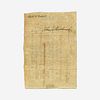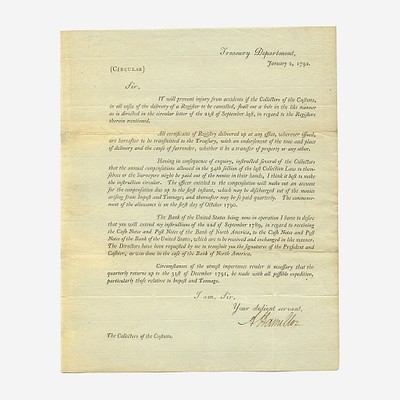[Hamilton, Alexander] [Panic of 1792] Deferred Stock Certificate of the United States
About Seller
2400 Market St
Philadelphia, PA 19147
United States
Established in 1805, Freeman’s Auction House holds tradition close, with a progressive mind-set towards marketing and promotion, along with access to a team of top experts in the auction business. And now with offices in New England, the Southeast, and on the West Coast, it has never been easier to ...Read more
Two ways to bid:
- Leave a max absentee bid and the platform will bid on your behalf up to your maximum bid during the live auction.
- Bid live during the auction and your bids will be submitted real-time to the auctioneer.
Bid Increments
| Price | Bid Increment |
|---|---|
| $0 | $25 |
| $500 | $50 |
| $1,000 | $100 |
| $2,000 | $200 |
| $3,000 | $250 |
| $5,000 | $500 |
| $10,000 | $1,000 |
| $20,000 | $2,000 |
| $30,000 | $2,500 |
| $50,000 | $5,000 |
| $100,000 | $10,000 |
About Auction
Oct 25, 2021
Freeman's is honored to present The Alexander Hamilton Collection of John E. Herzog, a single-owner sale of Alexander Hamilton material, on October 25. Curated by Darren Winston, Head of the Books and Manuscripts Department. Freeman's info@freemansauction.com
- Lot Description
[Hamilton, Alexander] [Panic of 1792] Deferred Stock Certificate of the United States
New York, March 16, 1792. One sheet, 5 1/4 x 7 3/4 in. (133 x 197mm). Partially-printed deferred 6% stock certificate of the United States (no. 43), signed by Joseph Sterlitz: "to receive from John Ferrers or order Five thousand�Dollars Deferred Stock of the United States and to pay him�or order for the same at the rate of Sixteen shillings and three pence in the pound..." Originally issued to New York City lawyer and notary, Paul R. Randall, signed by him on verso; his name crossed out and replaced by John Ferrers recto. Creasing from original folds. A fine example.
A fine deferred 6% stock certificate of the United States, issued during the week of the stock market crash that caused the Panic of 1792 (see lots 20, 22), the first financial crisis in the United States. This stock was issued by the Treasury Department under the tenure of Alexander Hamilton, for his plan to reform the finances of the United States, as a new government security following the Federal government's absorption of state debts. On March 23, financial speculator and former first Assistant Secretary of the Treasury, William Duer�one of the chief persons responsible for the cause of the Panic�was jailed for his actions. Two days earlier on March 21 was the first meeting of disaffected New York brokers who met in the Corre's Hotel to devise plans and regulations to organize securities trading. Two months later this plan would become the Buttonwood Agreement, the founding document of the New York Stock Exchange. "It was only after [Alexander] Hamilton intervened and helped rally the remaining few still-solvent Wall Street dealers around a plan to go forward, that the market slowly began to recover as the signing dealers began trading again among themselves." (Ned W. Downing, Wall Street Journal, March 24, 1997).
John Ferrers was one of the 24 prominent Wall Street dealers and signers of the Buttonwood Agreement. Rare.
- Shipping Info
-
No lot may be removed from Freeman’s premises until the buyer has paid in full the purchase price therefor including Buyer’s Premium or has satisfied such terms that Freeman’s, in its sole discretion, shall require. Subject to the foregoing, all Property shall be paid for and removed by the buyer at his/ her expense within ten (10) days of sale and, if not so removed, may be sold by Freeman’s, or sent by Freeman’s to a third-party storage facility, at the sole risk and charge of the buyer(s), and Freeman’s may prohibit the buyer from participating, directly or indirectly, as a bidder or buyer in any future sale or sales. In addition to other remedies available to Freeman’s by law, Freeman’s reserves the right to impose a late charge of 1.5% per month of the total purchase price on any balance remaining ten (10) days after the day of sale. If Property is not removed by the buyer within ten (10) days, a handling charge of 2% of the total purchase price per month from the tenth day after the sale until removal by the buyer shall be payable to Freeman’s by the buyer. Freeman’s will not be responsible for any loss, damage, theft, or otherwise responsible for any goods left in Freeman’s possession after ten (10) days. If the foregoing conditions or any applicable provisions of law are not complied with, in addition to other remedies available to Freeman’s and the Consignor (including without limitation the right to hold the buyer(s) liable for the bid price) Freeman’s, at its option, may either cancel the sale, retaining as liquidated damages all payments made by the buyer(s), or resell the property. In such event, the buyer(s) shall remain liable for any deficiency in the original purchase price and will also be responsible for all costs, including warehousing, the expense of the ultimate sale, and Freeman’s commission at its regular rates together with all related and incidental charges, including legal fees. Payment is a precondition to removal. Payment shall be by cash, certified check or similar bank draft, or any other method approved by Freeman’s. Checks will not be deemed to constitute payment until cleared. Any exceptions must be made upon Freeman’s written approval of credit prior to sale. In addition, a defaulting buyer will be deemed to have granted and assigned to Freeman’s, a continuing security interest of first priority in any property or money of, or owing to such buyer in Freeman’ possession, and Freeman’s may retain and apply such property or money as collateral security for the obligations due to Freeman’s. Freeman’s shall have all of the rights accorded a secured party under the Pennsylvania Uniform Commercial Code.
-
- Buyer's Premium



 EUR
EUR CAD
CAD AUD
AUD GBP
GBP MXN
MXN HKD
HKD CNY
CNY MYR
MYR SEK
SEK SGD
SGD CHF
CHF THB
THB![[Hamilton, Alexander] [Panic of 1792] Deferred Stock Certificate of the United States](https://s1.img.bidsquare.com/item/l/9470/9470953.jpeg?t=1MwoES)
![[Hamilton, Alexander] [Panic of 1792] Deferred Stock Certificate of the United States](https://s1.img.bidsquare.com/item/s/9470/9470953.jpeg?t=1MwoES)











